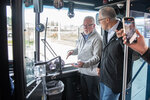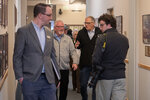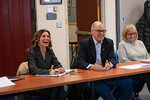


Sitting at a roundtable of leaders from energy, education, transportation and other sectors, Gov. Jay Inslee said Lewis County is poised to see a green energy boom in the coming years.
“Frankly, people don’t think of Lewis County as the origin of great, high technology,” Inslee said. “They need to understand, that is what is happening. And it’s happening because of you and this team really showing local leadership. That’s why it’s happening. It’s not coming from New York or Washington, D.C. It’s coming from right here.”
During a visit to Lewis County on Friday, Inslee heard updates on the work being done by Lewis County Transit, the Centralia School District, and other local groups and organizations to capitalize on the state’s green energy future.
“There are so many things going on here. The hydrogen hub that we have been able to get, in part, is because of the Climate Commitment Act (CCA). The transition in transportation that we’re going to see. The training in training people to take these new jobs,” Inslee said. “It’s hitting on all cylinders, so I cannot be more excited.”
According to the U.S. Department of Energy, the Pacific Northwest Hydrogen Hub, the “PNW H2,” will see up to $1 billion. Recipients of the funding include Puget Sound Energy, Twin Transit, Centralia College and USA Fortescue Future Industries. Twin Transit is the only transportation agency in the country awarded a hydrogen hub grant.
“It’s really exciting stuff,” Lewis County Transit Executive Director Joe Clark told Inslee.
Clark told the governor of Pedro Picazo, a Centralia High School junior who built a hydrogen-powered go-kart.
“We’re finding this spark in all of these children,” Clark said. “What I keep telling college students and high school students as I travel around is ‘Look, we’re all at the starting line. There’s nobody ahead of you. You have the greatest opportunity to get a career that you couldn’t have even imagined just a few years ago. And you’re not competing, you’re leading.’ ”
In October, Lewis County Transit, the Centralia School District and the Chehalis School District announced they had collectively obtained $375,576 in funding to support the first phase of the Renewable Energy Vehicle and Infrastructure Technician (REVIT) training program, which will develop a statewide curriculum in grades 8-12 STEM programs, according to previous reporting by The Chronicle. The curriculum will be available to high schools at no cost, and according to Clark, will be aligned with the college, so students can transition into either a certification, associate, or bachelor’s degree program.
“It’s going to be a game changer for workforce development in our community,” Clark said. “And we work with … unions and trade organizations. They look at this as just an accelerator for their potential interns and apprentices.”
This year, Centralia High School offers a green energy course with 25 students, with an even split of male and female students. The students, made up of mostly freshmen and sophomores, receive both a science and a CTE credit.
The district plans to offer a second course next year.
“It’s very exciting how they’re seeing the science come to life,” Centralia Superintendent Lisa Grant said. “They’re loving it.”
According to Grant, the district plans to develop an “energy academy, so that we can have kids that can be ready for these future careers that aren’t even developed.” The hope, she said, is to expand it into the elementary and middle school level.
“We think our kids, and our community, are really going to benefit for years to come,” Grant said.
A ride aboard Lewis County Transit
While officials could’ve likely talked excitedly for hours longer about what the push for green energy and hydrogen technology will mean for Southwest Washington, sometimes life is the best teacher.
Inslee’s visit included a ride on a fully electric Lewis County Transit bus from the college to a charging station on Mellen Street.
“We’re using the climate commitment act to make sure that people get more electric buses,” Inslee said. “Leading the world right here, and putting people to work.”
The system operates much like a wireless phone charger. By charging buses in 13 10-minute spurts throughout the day, Clark said Twin Transit has doubled the range of the bus.
“That’s really ahead of the curve,” Inslee said. “It’s really exciting to see where these world-leading systems are being developed. It’s very, very exciting.”
Inslee said the state is eyeing the purchase of more electric school buses, which he said makes riders more comfortable while reducing the noise emitted by both riders and the bus itself.
“The school bus drivers really, really like them,” Inslee said. “So we want to keep the Climate Commitment Act so we can continue to buy these electric school buses. All of this depends on the continued funding of the Climate Commitment Act.”
The ride was the latest for Inslee, who said he was the first member of Congress to drive both a hydrogen fuel cell bus and a lithium-ion battery bus.
“And I didn’t hit anything,” Inslee quipped, though was firmly in the passenger seat Friday.
Inslee touts the benefits of CCA
Environmental protection has become a hallmark of Inslee’s governorship, and according to Clark, he hears about it often when he travels.
“Everybody says, ‘You’ve got that green governor, don’t you?” Clark said. “Yeah, we do, and we’re lucky for that.”
His last year in office, though, includes a challenge to the Climate Commitment Act, wide-ranging legislation that requires a 95% reduction in emissions by 2050.
“Most people think of it just as a financial instrument, but its first priority is to limit pollution in the state of Washington,” Inslee said. “It puts a legally binding cap to prevent excess pollution.”
I-2117, an initiative filed to the Washington legislature, would repeal the auction for emission allowances for polluters, which funds climate projects across the state.
Since it went into effect in 2023, detractors have tied the market to higher gas prices in the state.
While not “advocating” a position on the initiative, Inslee repeatedly touted the CCA and how it can help the state moving forward.
“It has the polluters pay for the pollution that they cause,” Inslee said. “It limits pollution, has polluters pay, and puts the money in Washington to make investments.”
While lawmakers could adopt the initiative during the current session, Democrats in the legislature have not stated a desire to do so, which would send the initiative to the 2024 ballot.
“You need resources to do this work, it doesn’t all happen by magic. You’ve got to have some infrastructure, you need some financial resources,” Inslee said. “And the reason we are capable of doing these things is the Climate Commitment Act.”
The CCA, he said, enabled Washington’s inclusion in the hydrogen hub, allows investments in education, funds the replacement of filtration systems for cleaner air and gives eight million minors the ability to ride Washington’s buses for free.
“The source of our ability to grow this enterprise from this county is because of the Climate Commitment Act,” Inslee said. “It’s producing about $1.5 billion, all of which is coming right back to the State of Washington. It’s not going to Texas, it’s not going to New York.”